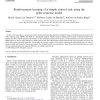34 search results - page 4 / 7 » Using Temporal Neighborhoods to Adapt Function Approximators... |
IAT
2005
IEEE
13 years 11 months ago
2005
IEEE
This paper presents a self-organizing cognitive architecture, known as TD-FALCON, that learns to function through its interaction with the environment. TD-FALCON learns the value ...
CDC
2010
IEEE
13 years 5 days ago
2010
IEEE
Abstract-- We consider reinforcement learning, and in particular, the Q-learning algorithm in large state and action spaces. In order to cope with the size of the spaces, a functio...
AAAI
1998
13 years 6 months ago
1998
In this paper, we describe methods for e ciently computing better solutions to control problems in continuous state spaces. We provide algorithms that exploit online search to boo...
JMLR
2006
13 years 5 months ago
2006
In this article we describe a set of scalable techniques for learning the behavior of a group of agents in a collaborative multiagent setting. As a basis we use the framework of c...
IJON
2006
13 years 5 months ago
2006
In this work, we propose a variation of a direct reinforcement learning algorithm, suitable for usage with spiking neurons based on the spike response model (SRM). The SRM is a bi...

